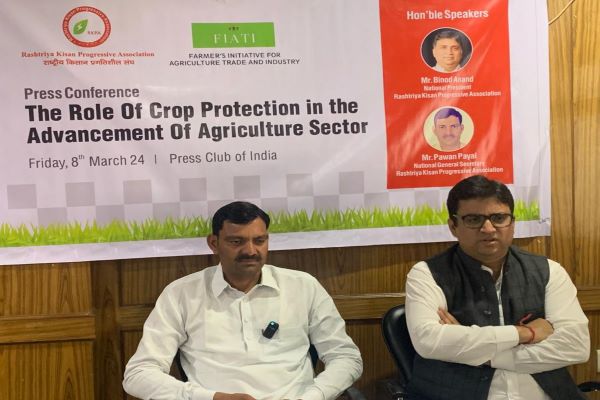Some vested interest dares to put the level of sub-standard products at 2% of the overall Indian market

Rashtriya Kisan Progressive Association (RKPA), a pan-India association that works for the welfare and progress of farmers across the country accused certain association and vested interest of working against the interest of farmers and condemned it for presenting misleading facts in the public domain.
Addressing a press conference in New Delhi, Binod Anand, National President, Rashtriya Kisan Progressive Association took strong exception to certain association pegging the level of sub-standard and spurious pesticides at just 2% per cent of the overall pesticides market of the country.
“India’s agricultural productivity has increased by more than 6 times since 1950, a remarkable achievement indeed. But unfortunately, per acre yield is way below in comparison to many developed and developing nations. Despite having 30% more arable land and 67% more rainfall than China, India’s agriculture GDP is about one-third of China. One major contributor to lower yields is the widespread use of low-quality inputs including agrochemicals. Yet, some vested interest dares to put the level of sub-standard products at 2% of the overall Indian market. This is nothing but misleading and cheating of farmers,” said Anand.
“The counterfeit pesticides market is a parallel industry as evident from various FIRs which have been registered against the culprits by reputed companies. It is adversely impacting farmers' livelihoods, yield, crop quality, income, and the Indian economy on a broader aspect,” Anand added.
Citing the example of the huge damage of 9 lakh acres of chili crops in South India in 2021, he said, “The damage was mainly due to usage of sub-standard pesticides in the sub-lethal dose. The ultimate sufferers were farmers and consumers. Strict action is a must against such culprits, but unfortunately, vested interests are strengthening such elements by presenting a misleading picture.”
Citing another example, Anand highlighted that the Karnataka government had drawn 250 samples of such pseudo pesticides and analyzing them in their labs, their labs and it is surprising that all of them were found laced with chemical pesticides but surprisingly no proper action was taken as it is the case of fraud, smuggling and simple case has been filed under Insecticide Act 1968 and Rules 1971.
“Few of these so-called Bio-pesticides/ Bio-stimulants were the cocktails of 10-12 chemical pesticides and some of them are not even registered in India which also indicates the possibility of smuggling of such chemicals from foreign countries,” he said.
Pawan Payal, National General Secretary, RKPA, Rashtriya Kisan Progressive Association also expressed similar views and highlighted discrepancies in sampling from pesticide dealers/ retailers as one of the root causes of the flourishing sub-standard pesticide market in the country.
Section 21 of the Insecticide Act, 1968 confers specific powers upon Insecticide Inspectors, and Rule 27 of the Insecticide Rules, 1971 delineates their duties. Rule 27(1) stipulates that the Insecticide Inspector will conduct inspections of all establishments selling insecticides within their jurisdiction, with a mandate to visit each licensee for inspection at least thrice and to draw samples for analysis,”
“Contrary to this, there have been a significant discrepancies observed in the sampling procedures by the insecticide Inspectors which is evident from the data obtained through RTI from the states of Rajasthan and Telangana. As per RTI data for the last 5 years, in Telangana State, approximately 50% of sampling (9430) is only from 8 companies out of a total 240 companies and out of total samples 19280. The balance sampling i.e., 9850 is from 232 companies, and from 48 companies just one sample on average has been drawn during the last five years. A similar situation exists in Rajasthan, where 83.51% of samples are drawn from "A" & "B" Graded companies, neglecting those with sub-standard products,” he said.
Subscribe to our newsletter & stay updated.